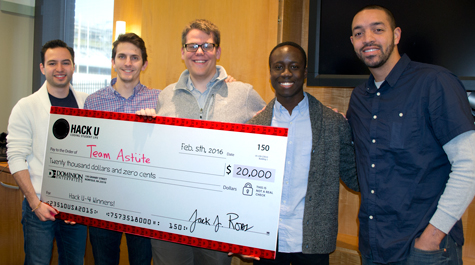The way they tell the story, app-developers Kelvin Abrokwa-Johnson and Nathan Owen were just two eager William & Mary students who came to AidData looking to gain career skills. What they came away with, though, was much more than that.
Last month Abrokwa-Johnson ’17 and Owen ‘17 won a $20,000 scholarship award at Dominion Enterprises’ Code-U hackathon in Norfolk, Va. Their winning application, nicknamed “Astüte,” helps students find study groups, based on majors and course offerings, all of which are pulled directly from the W&M catalog. Without the experience they gained while working at AidData, both students admit they would have never had the temperament and leadership skills to engineer such an award-winning app.

AidData and students Nathan Owen (C) and Kelvin Abrokwa-Johnson (2nd from R) with their award-winning "Astüte" team at the Dominion Enterprises Hack-U hackathon (Joseph McClain for W&M News)
The win reflects “the very direct influence of AidData on where I am today - which is focusing on software development and software engineering - and led to what we accomplished in this hackathon,” Abrokwa-Johnson said.
Any given semester, AidData employs up to 120 William & Mary undergraduates in various research assistant and internship roles across the project. After working with AidData’s student geocoding team as a freshman, Abrokwa-Johnson joined the data team looking to explore his newfound interest in computer science.
“Kelvin started with us without one ounce of programming ability,” said Scott Stewart, Chief Data Officer for AidData and both Abrokwa-Johnson and Owen’s supervisor. “He went from taking a Data Team skills course over the summer, to Data Team Research Assistant, to someone with serious developer skills in about a year. He is like a sponge and a born problem solver.”
Each student forges their own path. Opportunities at AidData range from participating in faculty-mentored research, working with the policy team to enhance the elite survey sampling frame of policymakers worldwide, geocoding project-level information from development donors around the world, to serving as an AidData Summer Fellow in a developing country. Beyond the technical expertise learned within their teams, the student experience at AidData also provides unique opportunities to gain key leadership and organizational skills.
“We pair new students with experienced students and provide mentorship with faculty and professional staff in the development landscape, “ said AidData Director of Operations David Trichler. “During the summers, we sponsor skills courses and research competitions, helping to fund students’ big ideas. We also help place students in internships, whether at the World Bank, Save the Children, USAID, or with nonprofits and civil society organizations in Uganda, Nepal and the Philippines. ”
Shortly after joining the Data Team, Abrokwa-Johnson was tasked with automating the production of geocoded aid datasets. Abrokwa-Johnson taught himself Python and JavaScript programming languages, and in time, became one of the most experienced student software developers on the project. “Computer science wasn't on the radar for me at all until I began to work here,” Abrokwa-Johnson admitted.
In fact, it was because of Abrokwa-Johnson’s personal reference that Owen was brought on the Data Team to replace him. Already focused on building upon his computer science studies, Owen spent his first stint at AidData alongside Stewart honing in the particulars of his field. “There were just a lot of professional experiences that I got while working with Scott that gave me a lot of perspective about what it is that I did and didn't like about software development,” Owen said, “and it’s going to guide the direction of my career.”
So what do these students think of the AidData student experience? Owen discussed how computer science and software development are particularly “difficult fields to dive into,” but that “what AidData does right is it invests in students. It takes people - often young students, freshman and sophomores, through their first steps of competency and gives them the opportunity to feel self-confidence. It allows them to really own something, make mistakes, and start developing for the first time.”
Trichler added, “We also help students learn how to work in teams, to be responsible for their work, and to deliver peer reviewed and quality research. When students apply for jobs, we help prep resumes and conduct mock interviews. If a student has been with us for several years, they'll have a body of work to stand behind, as well as the confidence and poise to talk about the work and tie it to the relevant issues of the day.”
While Owen and Abrokwa-Johnson continue to build upon their experience with further training outside of AidData – Abrokwa-Johnson has interned with Washington, D.C., based Mapbox and Owen will intern with Microsoft this summer – both have advice for those students who are looking to get involved with the project. “Everyone that I know that I can think of that worked at AidData were set on the right path by AidData to go on and do some really, really cool stuff,” Abrokwa-Johnson said. “You shouldn’t let your job title pigeonhole you into something a specific thing. Explore all and you will come out with so much more afterward.”
As Stewart reflected on the performance of the two students, he said, “I'd like to say we taught them everything they know, but the truth is AidData learned as much from them as we taught them.”
